The density power divergence (DPD) and related measures have produced many useful statistical procedures which provide a good balance between model efficiency on one hand, and outlier stability or robustness on the other. The large number of citations received by the original DPD paper (Basu et al., 1998) and its many demonstrated applications indicate the popularity of these divergences and the related methods of inference. The estimators that are derived from this family of divergences are all M-estimators where the defining $\psi$ function is based explicitly on the form of the model density. The success of the minimum divergence estimators based on the density power divergence makes it imperative and meaningful to look for other, similar divergences in the same spirit. The logarithmic density power divergence (Jones et al., 2001), a logarithmic transform of the density power divergence, has also been very successful in producing inference procedures with a high degree of efficiency simultaneously with a high degree of robustness. This further strengthens the motivation to look for statistical divergences that are transforms of the density power divergence, or, alternatively, members of the functional density power divergence class. This note characterizes the functional density power divergence class, and thus identifies the available divergence measures within this construct that may possibly be explored for robust and efficient statistical inference.
翻译:密度功率差异(DPD)和相关措施产生了许多有用的统计程序,在模型效率与超值稳定性或稳健性之间提供了良好的平衡。最初的DPD文件(Basu等人,1998年)及其许多明显应用收到的大量引文表明这些差异的流行程度及其相关的推算方法。从这种差异类别中得出的估计数据都是M-估计数据,其中确定$\psi$的功能明确以模型密度的形式为基础。基于密度功率差异的最小差异估计数据的成功使得在同一精神下寻找其他类似差异的必要性和意义。对数密度功率差异(Jones等人,2001年),即密度差异的逻辑变化,也非常成功地产生了具有高度效率的推断程序,同时具有高度的稳健性。这进一步加强了寻找正在改变密度功率差异的统计差异的动力,或者是功能性权力差异的成员,从而查明了这种功能性差异,从而查明了目前存在的功能性密度差异。



